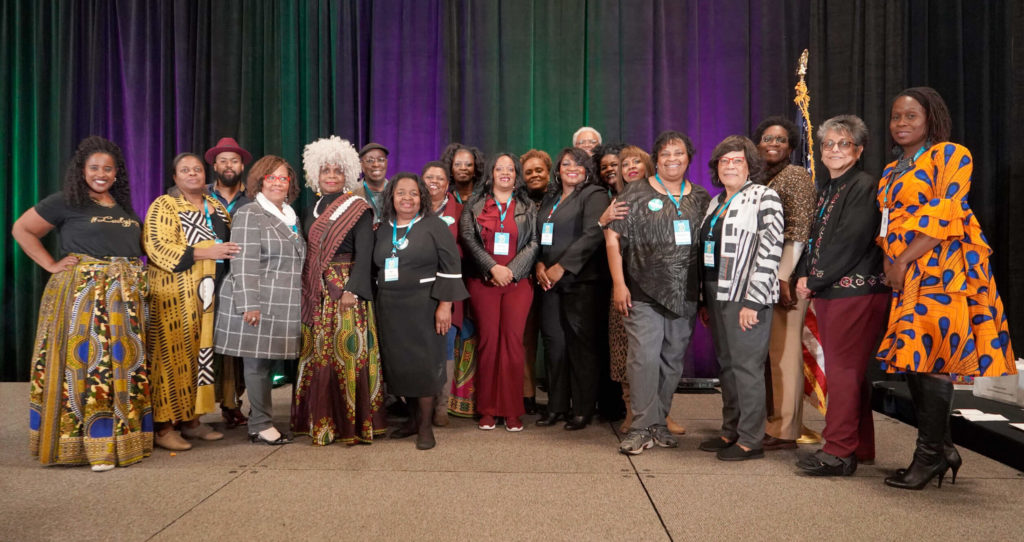Racism, discrimination, and inequity can significantly affect a person’s mental health. African Americans are 20% more likely to experience serious mental health issues than the general population and only one in three Black adults who need mental health care receive it. One study showed that 63% of Black people believe that a mental health condition is a sign of personal weakness. A lack of access to culturally competent care, mistrust in the American medical system, and a generational stigma related to recognizing mental health crises have created an environment where disparities in mental health care are far too common.
Every February, Integral Care hosts the Central Texas African American Family Support Conference (CTAAFSC) to share information and resources as well as build a community of support. Established over 20 years ago, CTAAFSC was the first conference in Texas and only the third in the United States to focus on the healthcare needs of African Americans. The conference was born from a desire to confront the systems and cultural bias that have resulted in African Americans facing barriers to healthcare access.
Last year’s conference boasted over 760 attendees, two keynotes, three panel discussions, 19 workshops and live entertainment. Attendees included mental health specialists, people with lived experience, members of the faith community, and business, non-profit and community leaders.
This year, we come together on February 7th and 8th at the Palmer Events Center for the first time in three years, continuing online access as well. The 2023 conference features two keynotes, 25 workshops, live music and entertainment. CTAAFSC speaker topics include parenting, faith and mental health, stigma around mental health, health equity, substance use and much more. Registration for this hybrid event is still open. In the meantime, I invite you to learn more about this year’s keynote speakers and a few of the workshops.
 Dr . Rheeda Walker, Professor of Psychology and Licensed Clinical Psychologist, University of Houston
Dr . Rheeda Walker, Professor of Psychology and Licensed Clinical Psychologist, University of Houston
Dr. Rheeda Walker is a Professor of Psychology and licensed clinical psychologist whose program of research emphasizes two understudied areas—suicide science and African American adult mental health. This work began at Florida State University where Dr. Walker earned a Ph.D. in Psychology (Clinical) in 2002. At the time, the suicide death rates were escalating for young, Black adults. Communities throughout the United States are chronically underserved in part due to social and cultural barriers. All of Dr. Walker’s scholarly work has focused on suicide and related emotional health challenges toward the primary goal of developing culturally relevant models of well-being. The National Institutes of Health, the University of Georgia Research Foundation, the Southern Illinois University Foundation, and the South Carolina Research Foundation funded this research.
 Thabiti Boone, Former Obama White House Fatherhood Initiative Representative, New York Knicks
Thabiti Boone, Former Obama White House Fatherhood Initiative Representative, New York Knicks
Thabiti Boone is an inspirational public figure, speaker, a college basketball Hall of Famer, author, leader, minister and humanitarian. He worked with President Obama’s Administration as a Representative for the President’s Fatherhood Mentoring Initiative where he helped spearhead the first White House convening on Black Men and Mental Health and increased health care enrollment for Black men across the country. As a member of the New York Knicks, Boone plays a key role with corporate and community partnerships, fan engagement initiatives and leading diversity, equity and inclusion efforts within the Black community. He was a distinguished professor at New York Theological Seminary, noted lecturer at Columbia University and Advisory Board Member for the Obama Foundation. He is an international officer for his Fraternity, Omega Psi Phi. As a Humanitarian, he founded Rising to the Occasion, a program that adopted schools in his former New York City Brooklyn Neighborhood, serving thousands of young students, promoting academic achievement, life skills, career enrichment and more.
Substance Use: A Conversation Around Substance Use, Mental Health and the Black Tax by Asha Creary, Clinic Director, Crave Counseling
This workshop will focus on the immediate and long-term impacts of substance use and how it impacts the mental and emotional health of the Black Family supporting a person’s journey with substance use.
Birthing While Black: A Qualitative Exploration into the Experiences and Implications of the COVID-19 Pandemic on Black Maternal Health and Care in Texas by Jaylen Wright, The University of Texas at Austin, Ph.D. Candidate, Health Behavior & Health Education
According to the CDC, the death rate of Black-birthing persons in the U.S. is 3 to 4 times the rate of non-Hispanic white pregnant-capable individuals and remains one of the widest of all racial disparities in reproductive health. Despite continued advancements in medical technology and reproductive care, the novel COVID-19 pandemic has had serious implications of psychological distress among Black communities and especially for Black-birthing people. This study explored the intersecting dynamics of pregnancy, race, gender, sex, and socioeconomic status, and provides insight into the unique physiological and emotional experiences of stress, coping, and support felt by Black birthing people in Texas during the COVID-19 pandemic.
Youth Supporting Youth: Innovations in Near-Age Peer Support by Elliott Phillip Niblack (MHPS, RSPS, ECSS), The D. Wood Foundation, Chief Equity and Education Officer
The D. Wood Foundation began a pioneering peer support program in 2022 targeting young adults in Historical Black Colleges and Universities and Austin Community College. The program uses the Jones-Niblack Peer Support Framework to deliver, engage, and evolve first-of-their-kind services where youth are trained and trusted to give support and meet the needs that they identify for themselves. Learn about the program’s origins, the transition from framework to implementation and more from the program creator and coordinator, Elliott Phillip Niblack.
Special thanks to our incredible Central Texas African American Family Support Conference Planning Committee, our sponsors, and public and private community collaborators who make this conference what it is today – a community hub for people seeking information, support and resources.
I hope to see you next month at the conference.

David Evans
Chief Executive Officer

 Dr . Rheeda Walker, Professor of Psychology and Licensed Clinical Psychologist, University of Houston
Dr . Rheeda Walker, Professor of Psychology and Licensed Clinical Psychologist, University of Houston Thabiti Boone, Former Obama White House Fatherhood Initiative Representative, New York Knicks
Thabiti Boone, Former Obama White House Fatherhood Initiative Representative, New York Knicks

 Ahead of CTAAFSC, we sat down with board member Deborah Smith, who is a content curator and documentary film producer. Smith has worked for the Texas Facilities Commission Historically Underutilized Business (HUB) Program and is a 2016 Central Health Community Health Champion. We talked about Black mental health, what she’s most looking forward to at this year’s conference and the power of storytelling.
Ahead of CTAAFSC, we sat down with board member Deborah Smith, who is a content curator and documentary film producer. Smith has worked for the Texas Facilities Commission Historically Underutilized Business (HUB) Program and is a 2016 Central Health Community Health Champion. We talked about Black mental health, what she’s most looking forward to at this year’s conference and the power of storytelling.